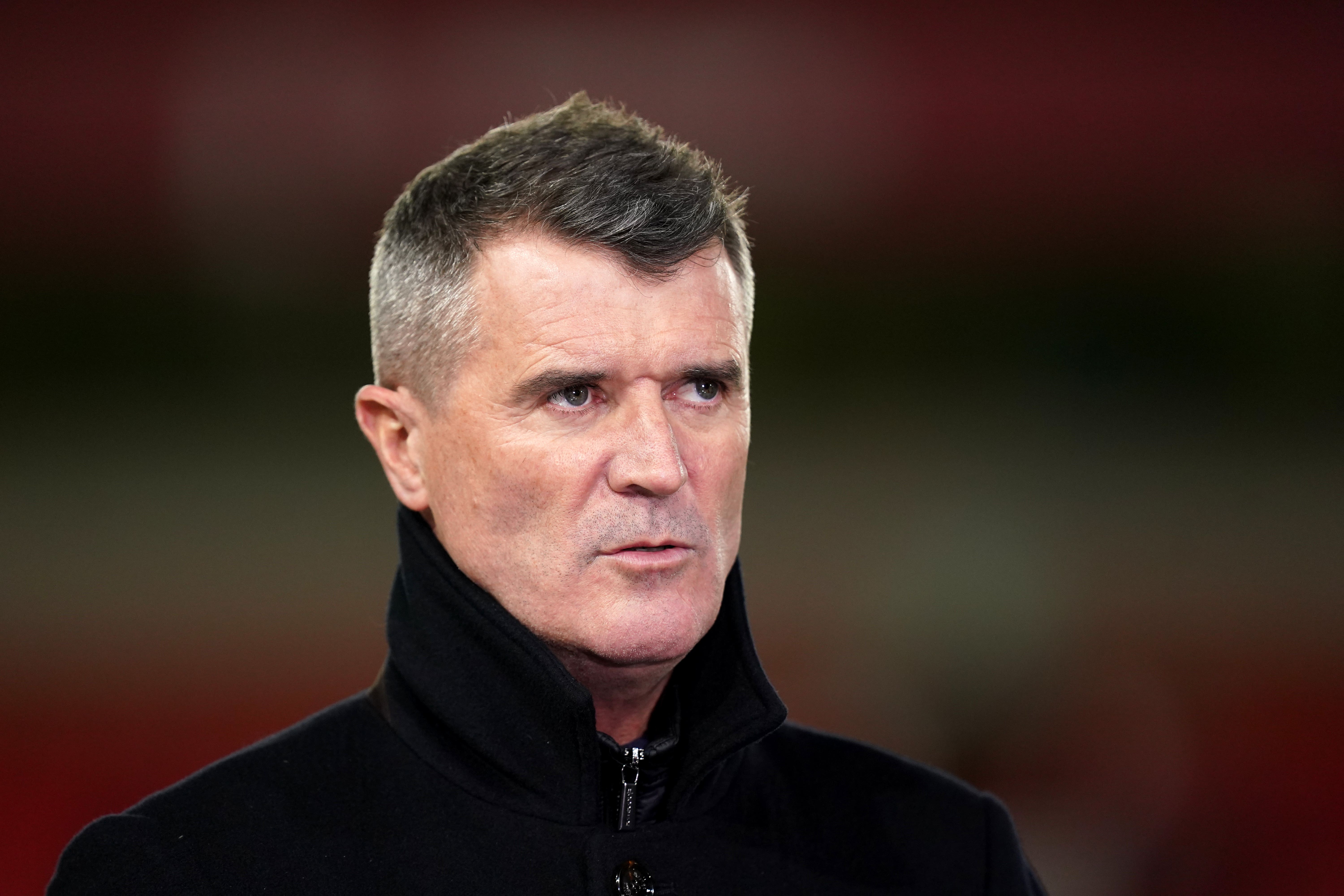The Roy Keane I know is no headbutter
Were you surprised the legendary Man Utd hardman walked away from the fan who attacked him? You shouldn’t be, writes Jim White, the new Roy Keane is a very different man from the old – and he tells a cracking anecdote


When footage emerged of an altercation after Arsenal’s victory over Manchester United on Sunday involving Roy Keane, you had an idea what it might entail before even casting an eye over it.
After all, in his heyday this was the most uncompromising footballer of his and many other a generation, the man who called out Patrick Vieira – someone at least six inches taller than him – in the players’ tunnel before a game; the man who stormed out of the World Cup to take his dog for a walk; the man who ended the career of Erling Haaland’s dad with a revenge attack of Shakespearean proportions.
But then what we saw wasn’t quite like that. The footage was of the aftermath of an assault on Keane in which a fan attempted to headbutt him. And rather than the man lying comatose on the deck as we might have expected, what we see is Keane’s Sky colleague Micah Richards grabbing the miscreant by the collar. In the background Keane taps Richards on the shoulder and suggests they both walk away. Nothing to see here, best leave it all be, “not worth it” is his body language.
Dignified, passive, eminently sensible, the only reaction can be: are we sure that actually is Roy Keane?
But then Keane has always been someone who defies expectation, someone who, for all the growly exterior, hides a complicated interior. Back in 2014, when he had just released his second autobiography, ghosted by the eminent Irish novelist Roddy Doyle, I was asked by his publisher to compere a few live appearances to plug the book. It was probably the easiest gig of all time: Doyle and I simply sat back while Keane went on a roll. A magnificent storyteller, with a comedian’s timing and a raconteur’s ease, he held the audience – which at the Old Trafford cricket ground numbered more than 800 – absolutely spellbound.
Funny, charming, he had a self-deprecating refusal to take himself seriously – which is not a frequent characteristic among the sporting elite. That said, boy does he have presence. When my phone rang just as he was approaching the punchline of yet another superb anecdote, the look he gave me was so scary it would have delivered immediate ease for the world’s worst case of constipation.
It is that reputation that has long been his calling card. When he first emerged as a football pundit, working for ITV soon after he had retired, the presenter Adrian Chiles looked visibly terrified by him. Twenty years on, footage of him shooting a death stare at a fellow pundit has become a favourite internet meme. But the fact is, whatever the fearsome assumption, there is always a twinkle in his eye.
Indeed, latterly, even as he has relentlessly monetised his reputation, so he has routinely undermined it. You can see it on The Overlap, his double act with Gary Neville, in which he constantly laughs at himself. You can see it on Sky Sports’ cinema scale commercial, called The Greatest Show on Earth.
In it, the broadcaster suggests that its sporting output is the modern equivalent of the circus, all footballers as acrobats, cricketers as slingshots, tennis players as trapeze artists. And the clown? It’s Keane, found in his dressing room by the ringmaster Idris Elba, looking forlorn at the very idea of emerging in comedy face paint. The only surprise is Elba doesn’t offer him a prawn sandwich as consolation.
As he has become an ever-bigger television celebrity, Keane has cleverly and carefully used his reputation to his advantage. Even if it is not representative of the real bloke. Because everyone is too nervous to ask for a selfie, he is rarely hassled in the way that so many of his contemporaries are. That said, he is remarkably careful in his public interactions. When he was publicising his book, he jokingly admitted that in his early days of fame, when he was still drinking heavily, if some of what he got up to had become public knowledge he would still be serving time.
These days, sober and aware, he knows that mobile phones are everywhere, ready to expose celebrity indiscretion. So, he is never indiscreet. When he was confronted by the obstreperous fan at the Emirates, his understanding was to remain aloof and controlled, even if his instinct was to flatten the bloke.
How things have changed. The old Keane would never have stepped back from a confrontation. When we were doing the book tour, at one venue, while we were in the green room, a waiter came in and asked us all what we would like to drink. I said, “A Diet Coke please.” At which Keane spluttered in alarm. “Not a f****** Diet Coke, f*** off, ask for anything but a f****** Diet Coke.” Seconds later, he realised his outburst had looked a little unexpectedly Coke-ist and he apologised.
“The thing is,” he explained. “I’ve had a thing about Diet Coke ever since one evening in a pub in Cork when I was first at United.”
He went on to explain that when the football season ended, he used to go back to his home city and indulge in a full-on, 24-hour boozathon. One time, he was in the pub in the neighbourhood where he was brought up, and it was now about 6am. There were some 20 people gathered round him at a table. Some he knew, some were friends of friends, some hangers-on he had never met. He announced it was his turn to buy the drinks and went round the table, asking what everyone wanted.
“Pint of Guinness, bottle of lager, double whiskey, then this bloke says, ‘Diet Coke please’,” he recalled. “So I hit the roof. What you want a Diet f****** Coke for? He says: ‘I’ve got to sober up, I have to be at work in half an hour’. So I says: ‘But you’ve had about 17 pints, a Diet Coke’s not going to sober you up.’ He says: ‘I got to do something’. So I says, ‘What is it you do for work, then?’ And you know what he says? ‘I drive the school bus’.”
You imagine that the old Roy Keane, losing his rag at the very thought of a soft drink, would not have walked away from an overexcited punter. And in a sense, we miss him.







Join our commenting forum
Join thought-provoking conversations, follow other Independent readers and see their replies
Comments